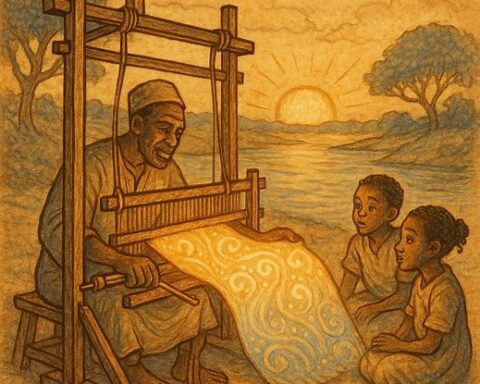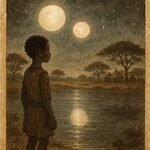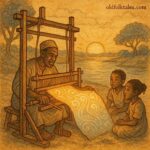In the old days, when chiefs were the keepers of both wisdom and power, there lived an Omanhene, the head of a great village. This ruler had three sons, each of them adventurous at heart. They longed to see the world beyond their father’s lands.
“Father,” said the eldest one day, “we ask your blessing. Let us travel and learn what lies outside our home.”
The Omanhene, though reluctant to part with them, agreed. “Go, but go wisely. The world is not as kind as the hearth.”
The Eldest Son’s Journey
The eldest son prepared for his journey. With a loyal servant at his side, he carried food, clothing, and gifts, confident in his strength. Days of travel brought him to a bustling town. At its center lived another Omanhene, a ruler known across the land not for his might, but for his obsession with riddles.
The townsfolk, bound by tradition, led the young traveler before the chief.
“Stranger,” said the riddle-loving Omanhene, his voice sharp as a drumbeat, “in my town there is law. No guest may stay without besting me in riddles. Should you fail, the penalty is death. Tomorrow, we begin.”
The young man trembled, but it was too late to turn back. At dawn he stood before the gathered court. The Omanhene asked riddle after riddle, each clever and twisting like a serpent’s path. The traveler, unprepared, could not answer. By the law of the land, he was executed.
The Second Son’s Fate
Time passed, and the second brother, unaware of his sibling’s fate, set off on his own journey. By cruel chance, he too arrived at the same town. Just as his brother had, he faced the riddle contest. Just as before, he failed. His life was taken beneath the watchful eyes of the assembly.
The Third Son’s Determination
At last, the youngest son declared his desire to travel. His mother clung to him in tears.
“My son, I beg you, do not go. I have lost two of my children already. If you reach that cursed town, the same doom will meet you.”
But he was resolute. “Mother, fate calls me, and I must answer.”
Seeing her pleas were in vain, she prepared provisions for his journey. Yet, grief clouded her judgment. She baked cankey, a cake of corn, and laced it with poison. “Better he die by my hand than by a stranger’s axe,” she whispered in sorrow.
The boy set off. Soon, hunger gnawed at him. He looked at the cankey but hesitated. His mother had not wanted him to leave. Could she have betrayed him?
To test it, he threw a piece to a vulture that was circling above. The bird swooped down, devoured the cake, and within moments fell dead. Soon, three panthers came upon the vulture and ate it. One after another, they collapsed lifeless.
The young man stared in shock. “It is true. My own mother sought my death.”
From the panthers, he cut meat and roasted it carefully, packing it in his bundle.
The Seven Robbers
Further along the road, seven robbers leapt from hiding. “Give us your goods or your life!” they shouted.
The young man held up his hands. “Spare me, and I will share roasted meat with you. Let us eat together before you take my possessions.”
The robbers, greedy and careless, agreed. He divided the meat into eight parts, keeping one for himself but hiding it away. The seven robbers ate heartily. Before long, each fell dead upon the ground.
With calm steps, the youth continued his journey.
The Riddle Contest
At last he arrived at the dreaded town where his brothers had died. Just as before, he was summoned before the riddle-loving Omanhene. For two days, they battled wits, question for question, answer for answer. Neither could claim victory.
On the third day, the young man said, “I have one last riddle. If you solve it, you may execute me. If you fail, the law will judge you.”
The assembly leaned in as he spoke:
“Half kills one,
One kills three,
Three kills seven.”
The Omanhene frowned. He could not unravel its meaning. Night fell, and he plotted treachery. Disguised, he crept to the stranger’s lodging and found him asleep. Believing him to be only the servant, the Omanhene offered a reward in exchange for the answer.
The clever youth, feigning innocence, agreed—but only if the chief would bring his ceremonial garments. The Omanhene fetched them eagerly. Once he handed them over, the youth revealed the riddle’s meaning: the poisoned cankey had killed a vulture, one vulture had killed three panthers, and three panthers had killed seven robbers.
The Omanhene, overjoyed at having the answer, warned the supposed servant to keep silent.
The Judgment
At dawn, the contest resumed. Before the whole assembly, the Omanhene proudly gave the answer to the riddle. But the stranger rose and demanded, “Where are your ceremonial robes? A true Omanhene does not come to Assembly without them.”
The ruler faltered. The youth revealed how the Omanhene had cheated, stealing the answer through deceit. The court erupted in anger.
“You have broken your own law,” declared the elders. “The penalty is death.”
The riddle-loving Omanhene was executed, and the wise young man was chosen to rule in his place.
Moral of the Story
This Wolof folktale teaches that wisdom without honesty brings ruin. True cleverness is not only in solving riddles but also in living with integrity. Deceit and greed destroy leaders, while patience and foresight raise the just to power.
Knowledge Check
Q1: Who were the three sons of the Omanhene?
They were adventurous young men eager to travel the world.
Q2: What law did the riddle-loving Omanhene enforce on strangers?
Strangers had to answer his riddles correctly or face execution.
Q3: How did the third son test the poisoned cankey?
He fed it to a vulture, which died, followed by three panthers and seven robbers.
Q4: What was the meaning of the riddle “Half kills one, One kills three, Three kills seven”?
It referred to the chain of deaths caused by the poisoned cankey, the vulture, and the panthers.
Q5: How did the riddle-loving Omanhene try to cheat?
He disguised himself at night and tricked the young man into giving the answer.
Q6: What happened to the Omanhene in the end?
He was executed for dishonesty, and the young traveler was made Omanhene.
Cultural Origin: Wolof folktale, Senegal






